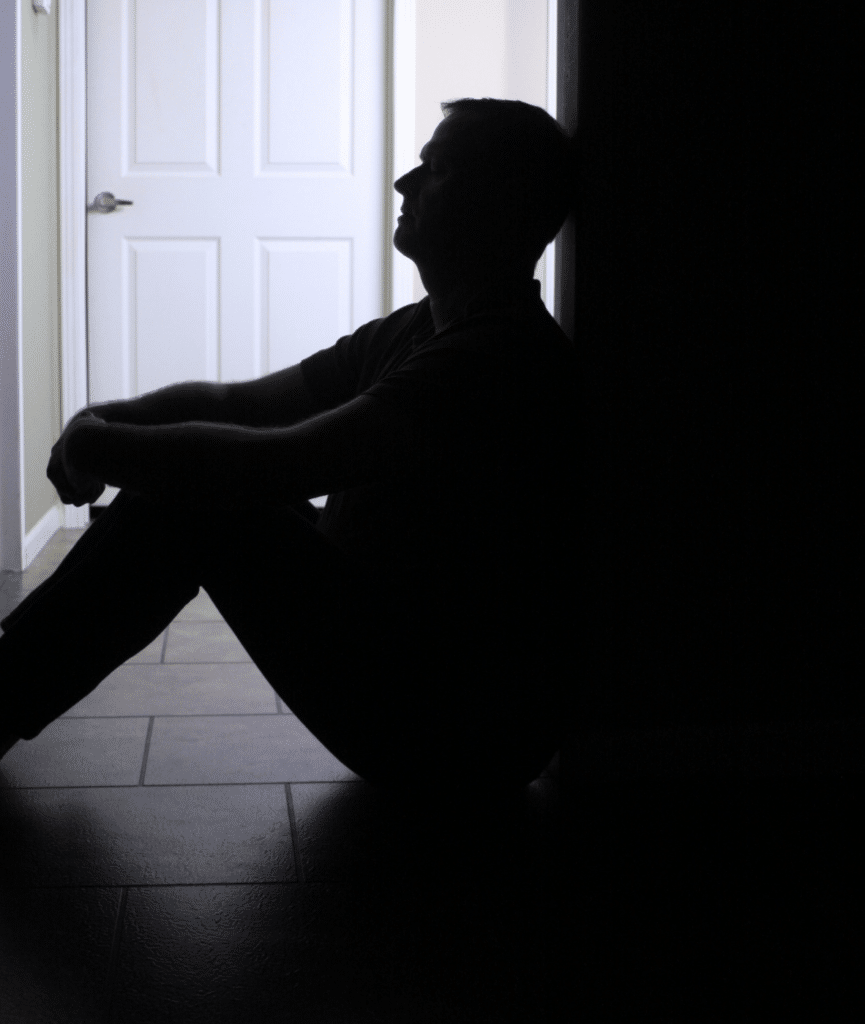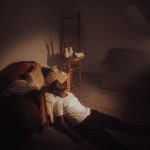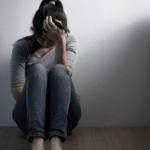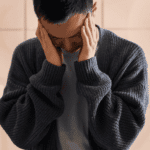21 Signs and Symptoms of Depression – What to Look Out For

It’s not always easy to know if you have depression. You may tell yourself you’re fine, talk yourself out of it, or not know enough about it to decide. That’s where the signs and symptoms of depression can come in handy.
The American Psychiatric Association created a tool called the Diagnostic and Statistical Manual of Mental Disorders (DSM-5) to help mental health professionals and doctors diagnose mental health conditions like depression.
Fortunately, this tool can also help us understand the warning signs of depression, allowing people struggling with depression to notice their symptoms and get the support they need.
Below, we explore 21 early signs of depression, including the emotional, cognitive, physical, and behavioral depression indicators, grounded in the criteria from the DSM-5. We’ll finish with guidance on the treatment options for depression, so you can get the support you need ASAP.

Key Takeaways
- Depression affects mood, thinking, physical health, and behavior — not just feelings.
- Common emotional symptoms: persistent sadness, hopelessness, guilt, irritability, or emptiness.
- Physical and behavioral clues: changes in sleep, appetite or energy; slowed movement; difficulty concentrating.
- Depression often leads to withdrawal from people, loss of interest in hobbies, and reduced enjoyment of life.
- Recognizing a cluster of symptoms lasting weeks can signal need for professional evaluation.
Table of Contents
21 Warning Signs of Depression
Every person’s experience of depression is different, so these warning signs should act only as a guide to help you identify if you or a loved one may be struggling with depression. We always recommend reaching out either to our team or a doctor to receive a formal depression diagnosis.
Emotional Symptoms of Depression
1. Low Mood That Won’t Shift
We all have periods where we feel down or sad. However, these feelings tend to pass, and we go back to a baseline of feeling okay, content, or happy. If you’re struggling with depression, on the other hand, your baseline feeling may be sadness or feeling low.
Some people with depression describe the low mood associated with depression as different from a normal sense of sadness. Instead, they suggest it’s more like feeling completely disconnected from the world, in a very intense state of sadness and isolation.
2. Feeling Hopeless, Helpless, or Lost
Feeling helpless and hopeless is another characteristic depression symptom. Many people with depression feel this way the majority, if not all of, the time.
However, it’s important to note that this can differ depending on a person’s race or ethnicity. Research shows that Latino and Hispanic people tend to feel hopeless all or at least most of the time, while Native Hawaiians and Pacific Islanders are more likely to feel like everything’s an effort.1
3. Having Low Self-Esteem
Depression often comes with its fair share of negative thoughts, and many of these are directed internally, at ourselves. Self-esteem is the opinions we hold about ourselves, so having low self-esteem typically means you see yourself as unworthy or “not good enough.”
You can identify if you struggle with low self-esteem by asking yourself:
- When something goes wrong, am I quick to place the blame at my own door?
- Are the thoughts inside my head about myself kind or self-critical?
- Do I often feel like I’m not good enough, even when I receive praise?
If you see yourself in a negative light, chances are, you struggle with low self-esteem.
4. Getting Tearful Unexpectedly
Many people with depression say they sometimes burst into tears unexpectedly, often saying this is with no trigger event. Research shows that those with depression are more likely to cry often, or for seemingly no reason.2
While it may feel like there’s no reason at the time, depression can wreak havoc on your emotions, and crying is an important way the body releases and expresses these emotions.
5. Feeling Filled With Guilt
The American Psychiatric Association lists inappropriate or excessive guilt as one of the core signs of depression in the depression DSM-5.3 This sign is thought to be linked to low self-esteem and feelings of worthlessness.
6. Feeling Anxious or Worried
Unfortunately, depression doesn’t just come with low mood and low self-esteem – it can also make you feel on edge, anxious, or worried. Studies show that up to 50% of people with depression also experience high levels of anxiety. So, depression and anxiety are closely interlinked.4-8
7. Feeling Irritable and Intolerant of Others
Irritability often comes with the territory of depression. However, this appears to be more common in men. When you experience irritability as part of depression, you may experience yourself feeling angry, impatient, or frustrated with those around you, particularly your loved ones. You may find small things they do irrationally irritating, causing you to snap or become frustrated with them.9
Cognitive Symptoms of Depression
8. Having No Motivation or Interest in Things
Some people with depression don’t struggle with sadness as their main symptom. Instead, they find that the biggest impact depression has on their life is a lack of motivation. Depression can involve having no motivation to do anything, which may lead to spending a long time lying in bed or on the couch thinking about all of the work there is to do but not having the motivation to do it.
9. Getting No Enjoyment Out of Life
Depression can drain the enjoyment out of life, either making you feel numb or like nothing brings you joy. You may go see your friends, eat food you love, or spend time with your partner, only to feel…nothing. This lack of enjoyment is known as anhedonia and can feed into the difficulties of getting motivated.
10. Finding It Difficult to Make Decisions
Indecisiveness is so common in those with depression that it’s listed in the DSM-5 criteria. Research shows that people tend to find it far more difficult to make decisions while struggling with depression. What’s more, people tend to make different choices than they would if they didn’t have depression, which has led doctors and psychotherapists in the past to recommend not making major life decisions when you are depressed.10
11. Having Suicidal Thoughts or Thoughts of Harming Yourself
Suicidal thoughts are relatively common in major depression, although it’s important to note that not everyone with depression experiences thoughts of harming themselves or ending their life. Nevertheless, those with depression are at an elevated risk of both suicidal thoughts and acting on these; the prevalence of suicidal thoughts in major depressive disorder (MDD) is 53% and 31% for suicide attempts.11
If you or someone you know is experiencing thoughts of harming themselves, it’s important to reach out to a support service immediately. If you need support, please contact us at 866-721-7952 and we can direct you to relevant services.
Physical Symptoms of Depression
12. Moving or Speaking More Slowly Than Usual
Slowed-down movements and speech are key depression indicators. The technical term for this is psychomotor impairment, which means impairment of physical actions due to differences in brain activity.
There are many scientific theories on why this may happen. Some experts found that it may relate to the neurotransmitter dopamine, which is often negatively affected in depression. Alternatively, it could be linked to the stress hormone cortisol, or areas of the brain responsible for muscle movements.12
13. Struggling With No Energy
A lack of energy is one of the most prevalent symptoms of major depressive disorder, affecting around 90% of those with an MDD diagnosis.13 This isn’t just true for the early stages of depression, but throughout the whole duration of experiencing the condition.14
The lack of energy associated with depression could be due to difficulties sleeping, stress, antidepressant medications, or a combination of all of these (or something else entirely!).
14. Changes in Weight or Appetite
Changes in weight or appetite can increase the risk of depression, and vice versa. Research shows that depression can cause both increases and decreases in appetite. Side effects of antidepressant medication could factor into this. Alternatively, if someone loses a love for food as a result of depression, it may feel less rewarding to eat than previously.15
15. Constipation
Depression often involves chronic depression, which can be uncomfortable, to say the least. Our gut health and mental health are intricately linked, so it’s possible to experience difficulties in our stomach and gut as a result of mental illness.
Although studies haven’t yet painted a clear picture of why constipation and depression coincide, one theory is that it’s down to the impact depression has on serotonin levels. Serotonin is a “happy” hormone and neurotransmitter that not only boosts mood but is used by neurons in the gastrointestinal system. So, dysfunction in serotonin levels may lead to dysfunction in the gut.
16. Aches and Pains With No Physical Explanation
Just like mental illness can lead to gut ill health, it can also affect the rest of our physical health. The aches and pains that show up as a sign of depression tend to include limb pain, headaches, joint pain, and back pain.
Treatments such as talk therapy, medication, relaxation techniques, and pain rehabilitation programs can help with aches and pains as a result of depression.16
17. Less Interest in Sex Than Normal
It’s common for sexual desire to be low or completely missing in people with depression, as the hopelessness, low self-esteem, and lack of energy that can come with depression lower your sex drive. Depression can also make it harder for men to get an erection and for both men and women to have an orgasm.
Antidepressants can also reduce a person’s sex drive, making them less interested in sex than they normally would be.17
18. Disturbed Sleep
Approximately three-quarters of people with depression struggle with insomnia. A lack of sleep can affect our lives in multiple ways, negatively impacting our mood, energy, and mental health in general, and may worsen depression symptoms. What’s more, insomnia is associated with a lower quality of life and a higher risk of suicide.18
If you’re struggling with insomnia as a result of depression, don’t hesitate to reach out at 866-721-7952. You’re not alone, and we can support you.
Behavioral Symptoms of Depression
19. Avoiding Contact With Friends
Many people with depression say they don’t want to burden their friends when they’re feeling depressed. This is just one of the reasons why a person may withdraw from their friends when they’re depressed. Other reasons could be a lack of energy or no longer finding enjoyment in doing so.
20. Not Engaging With Your Hobbies or Interests
Anhedonia can make it feel unimportant or uninteresting to do the hobbies and interests you usually love. For this reason, you may feel unmotivated or lack the energy to put time and effort into your hobbies and interests.
21. Facing Difficulties at Work, Home, or Family Life
Depression often makes it difficult to go to work and show up in the way you want to with your family, partner, and friends. The emotional, physical, behavioral, and cognitive symptoms we’ve delved into can make it feel impossible to get along with others and to do day-to-day tasks. What’s more, conflicts can occur more often due to the irritability and low mood that comes with depression.19
If you read through this depression symptom checklist thinking, “Yep, yep, yep” it’s important to seek help. Depression is much, much more than just a passing low mood – it can impact your life in many ways, including your relationships, daily life, and well-being. But fortunately, support is available, and effective treatment can help you start to feel like yourself again.
At Mission Connection, we understand that depression looks different for everyone. That’s why we offer a range of evidence-based treatment options tailored to your unique experience. Our compassionate team is here to help you face the challenges of depression with the best support available.
We offer both inpatient and outpatient programs to match the level of support you need. Our outpatient services, including Intensive Outpatient Programs (IOP) and Partial Hospitalization Programs (PHP), provide structured care while allowing you to maintain your daily responsibilities.
We also provide a range of therapy options, including:
- Cognitive Behavioral Therapy (CBT), which helps to reframe negative thought patterns and behaviors.
- Dialectical Behavior Therapy (DBT), which supports your emotional well-being and helps you develop healthy coping strategies.
- Interpersonal Therapy, which will allow you to explore the role of relationships and relationship conflicts in your emotions and overall well-being.
Our additional mind-body integration services, such as movement therapy and sound baths, can help address the body aches, fatigue, and sleep disturbances that so commonly arise with depression.
If you’re struggling right now, or know someone who might be, don’t wait to reach out. Contact us today at 866-721-7952. You deserve help, and there is hope.

References
- Centers for Disease Control and Prevention. (2018). Summary health statistics: National Health Interview Survey. https://ftp.cdc.gov/pub/Health_Statistics/NCHS/NHIS/SHS/2018_SHS_Table_A-7.pdf
- Zoppi, L. (2024, November 5). Why might a person cry for no reason? Medical News Today. https://www.medicalnewstoday.com/articles/crying-for-no-reason
- American Psychiatric Association. (2013). Diagnostic and statistical manual of mental disorders: DSM-5.
- Mph, Z. S. (2022, March 29). Anxiety vs. depression: Similarities and differences. https://www.medicalnewstoday.com/articles/anxiety-vs-depression
- Kalin, N. H. (2020). The critical relationship between anxiety and depression. American Journal of Psychiatry, 177(5), 365–367. https://doi.org/10.1176/appi.ajp.2020.20030305
- World Health Organization: WHO. (2023, September 27). Anxiety disorders. https://www.who.int/news-room/fact-sheets/detail/anxiety-disorders#:~:text=Anxiety%20disorders%20increase%20the%20risk,settings%2C%20primarily%20affecting%20children).
- Wilmer, M. T., Anderson, K., & Reynolds, M. (2021). Correlates of Quality of life in Anxiety Disorders: Review of Recent research. Current Psychiatry Reports, 23(11). https://doi.org/10.1007/s11920-021-01290-4
- Wittchen, H. U., Kessler, R. C., Pfister, H., & Lieb, M. (2000). Why do people with anxiety disorders become depressed? A prospective-longitudinal community study. Acta psychiatrica Scandinavica. Supplementum, (406), 14–23.
- Healthdirect. (n.d.). Irritability and feeling on edge. https://www.healthdirect.gov.au/irritability-and-feeling-on-edge#:~:text=Irritability%20involves%20feelings%20of%20anger,antisocial%20personality%20disorder
- Leykin, Y., Roberts, C. S., & DeRubeis, R. J. (2010). Decision-Making and Depressive symptomatology. Cognitive Therapy and Research, 35(4), 333–341. https://doi.org/10.1007/s10608-010-9308-0
- Cai, H., Xie, X., Zhang, Q., Cui, X., Lin, J., Sim, K., Ungvari, G. S., Zhang, L., & Xiang, Y. (2021). Prevalence of Suicidality in Major Depressive Disorder: A Systematic Review and Meta-Analysis of Comparative Studies. Frontiers in Psychiatry, 12. https://doi.org/10.3389/fpsyt.2021.690130
- Lopez, Irene. (2024, October 6). Psychomotor retardation. WebMD. https://www.webmd.com/depression/what-to-know-about-psychomotor-retardation
- Ghanean, H., Ceniti, A. K., & Kennedy, S. H. (2018). Fatigue in Patients with Major Depressive Disorder: Prevalence, Burden and Pharmacological Approaches to Management. CNS Drugs, 32(1), 65–74. https://doi.org/10.1007/s40263-018-0490-z
- Targum, S. D., & Fava, M. (2011). Fatigue as a residual symptom of depression. Innovations in clinical neuroscience, 8(10), 40–43.
- Coccurello, R. (2019). Anhedonia in depression symptomatology: Appetite dysregulation and defective brain reward processing. Behavioural Brain Research, 372, 112041. https://doi.org/10.1016/j.bbr.2019.112041
- Hall-Flavin, D. K. (2019, April 3). Pain and depression: Is there a link? Mayo Clinic. https://www.mayoclinic.org/diseases-conditions/depression/expert-answers/pain-and-depression/faq-20057823
- Cleveland Clinic. (n.d.). Depression and sex. https://my.clevelandclinic.org/health/diseases/9296-sexual-problems-and-depression-
- Nutt, D., Wilson, S., & Paterson, L. (2008). Sleep disorders as core symptoms of depression. Dialogues in Clinical Neuroscience, 10(3), 329–336. https://doi.org/10.31887/dcns.2008.10.3/dnutt
- Zuelke, A. E., Roehr, S., Schroeter, M. L., Witte, A. V., Hinz, A., Engel, C., Enzenbach, C., Thiery, J., Loeffler, M., Villringer, A., & Riedel-Heller, S. G. (2020). Are social conflicts at work associated with depressive symptomatology? Results from the population-based LIFE-Adult-Study. Journal of Occupational Medicine and Toxicology, 15(1). https://doi.org/10.1186/s12995-020-0253-x
Depression Symptoms FAQs
Symptoms refer to persistent emotional, cognitive, physical or behavioral changes — such as low mood, loss of interest, sleep disruption, or social withdrawal — that last for weeks and affect daily function.
Yes. Depression can cause fatigue, changes in appetite or weight, sleep problems, slowed movement or speech, and unexplained aches.
No — experiences vary widely. Some may feel deep sadness and hopelessness while others experience irritability, numbness, or a sense of emptiness. It varies depending on factors like genetics, coping mechanisms, and situational stressors.
If symptoms persist for most of the day, nearly every day, disrupt normal functioning (work, relationships, daily tasks), or include suicidal thoughts — it’s time to consult a mental‑health professional.
Yes — occasional sadness or mood changes are often part of life. What distinguishes depression is persistent, pervasive symptoms over weeks that impair daily functioning.
- Signs of Treatment-Resistant Depression
- Signs of Depression Relapse
- Depression-Related Sleep Issues
- Depression Symptom Checklist
- ICD-10 Criteria for Depression
- Major Depressive Disorder (MDD) Symptoms
- Depression Symptoms
- Depression Self-Test
- PHQ-9 Depression Test
- Warning Signs of Depression
- Types of Depression
- Best Therapies for Depression
- Talk Therapy for Depression
- Telehealth for Depression
- Personalized Therapy for Depression
- Holistic Treatment for Depression
- Online Therapy for Depression
- Effective Treatments for Depression
- Medications for Depression
- Treatment-Resistant Depression Options
- Depression Relapse Prevention






